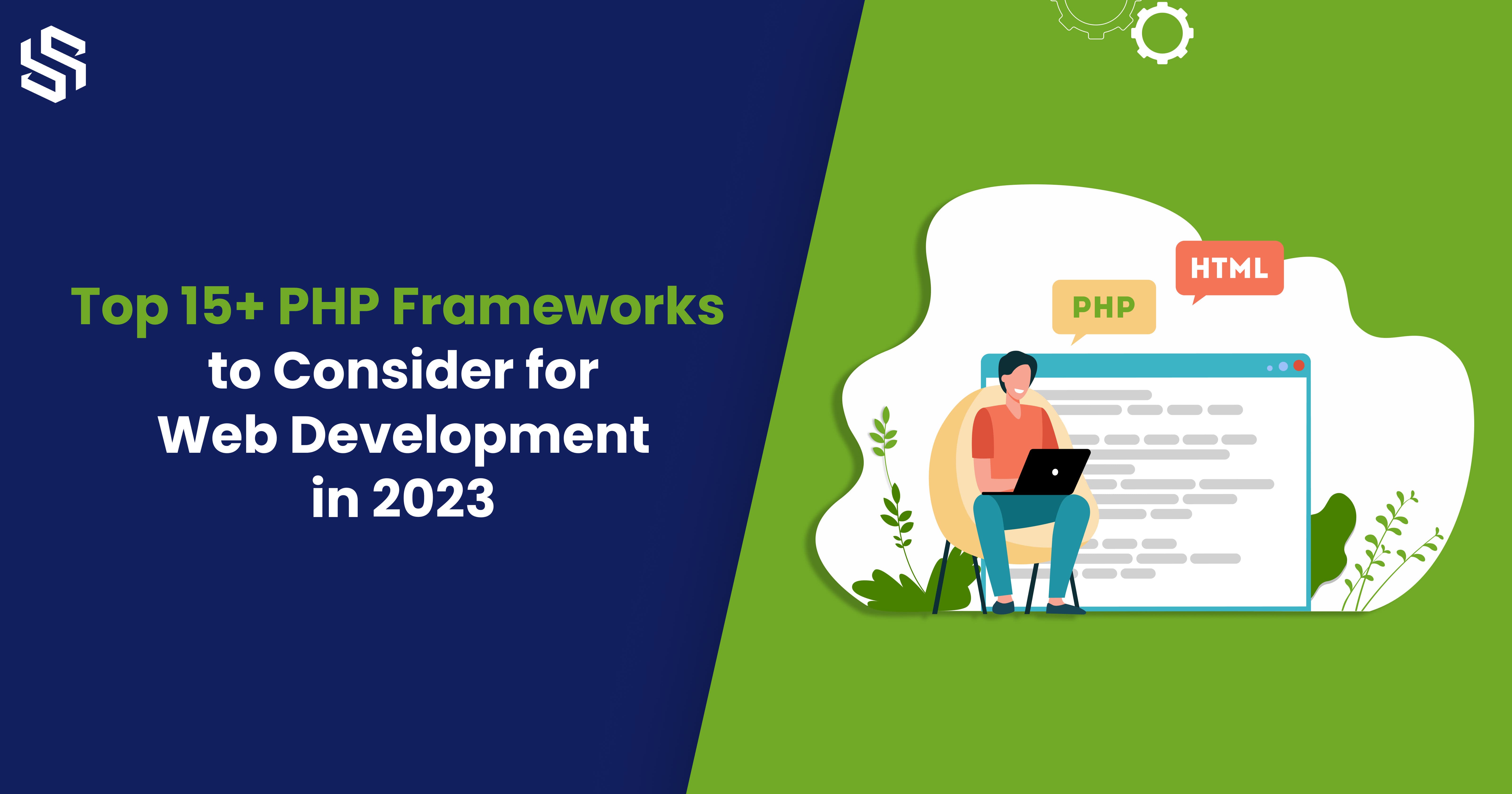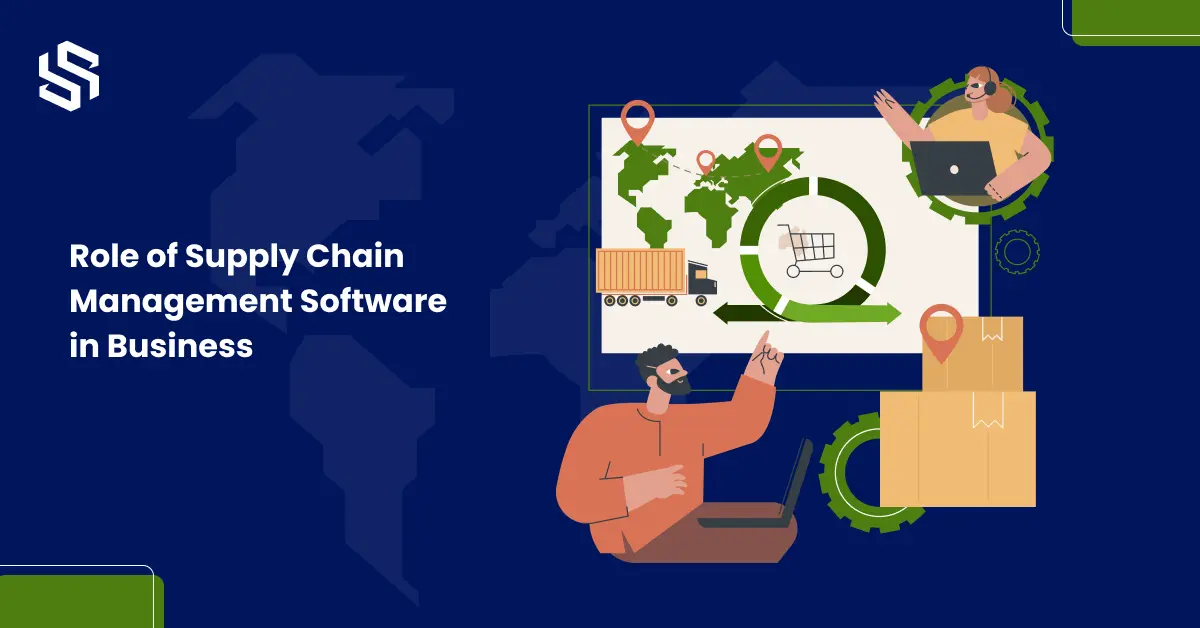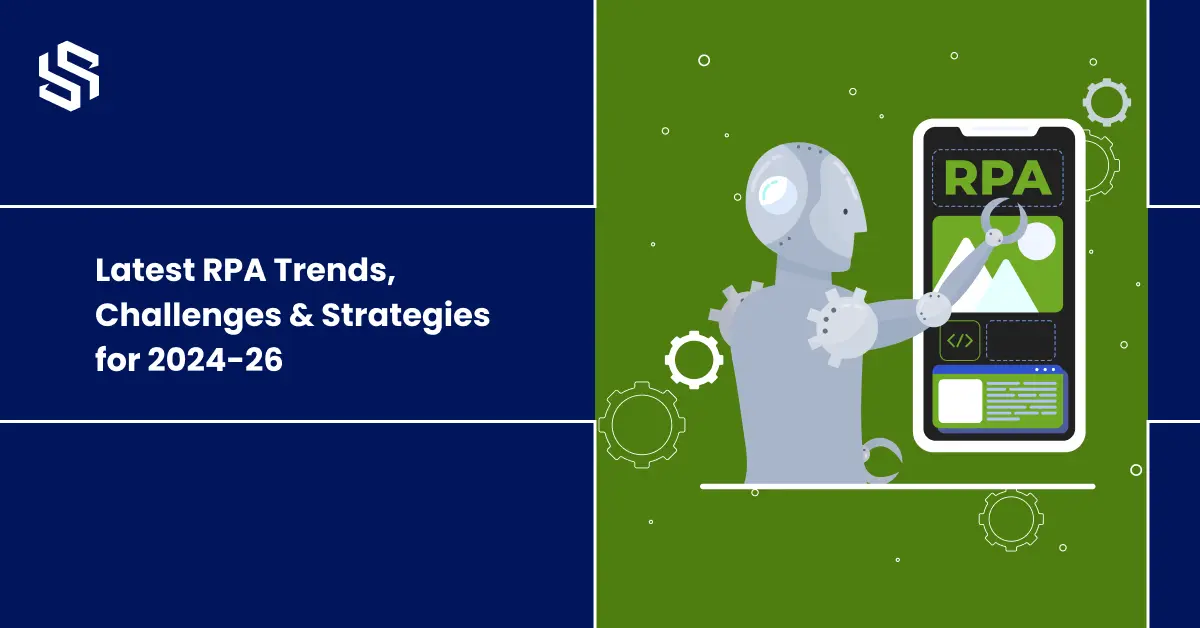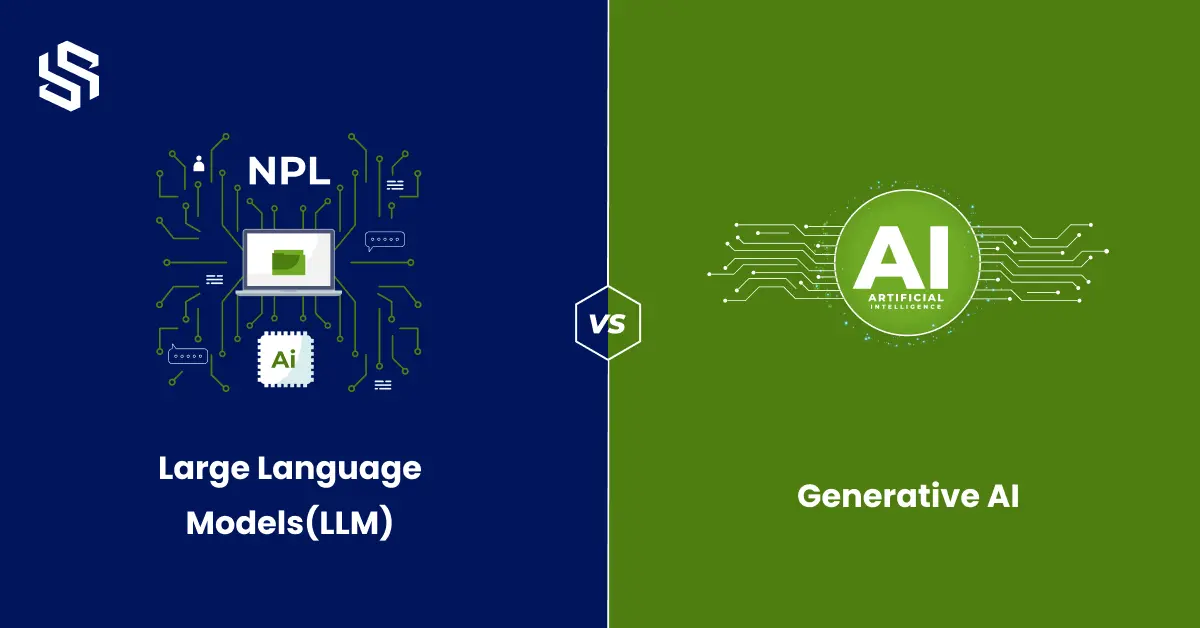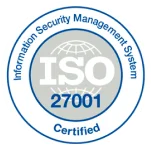Are you looking to venture into web development in 2023? PHP frameworks can be your best allies in building robust, scalable, and efficient web applications. With a plethora of options available, choosing the right PHP framework becomes crucial for your development journey.
In this article, we present you with a curated list of the top 15+ PHP frameworks to consider for web development in 2023. These frameworks have gained popularity and proven their worth in the industry, offering a wide range of features, performance optimizations, and developer-friendly environments.
Whether you are a seasoned developer or just starting your web development journey, these PHP frameworks provide the necessary tools and structure to streamline your development process. From MVC architecture to database abstraction, security enhancements to templating engines, each framework brings its unique strengths to the table.
So, get ready to explore the world of PHP frameworks and discover the perfect fit for your web development needs. Let’s dive in and unlock the potential of these cutting-edge PHP frameworks that will shape the web development landscape in 2023 and beyond.
What Exactly is a PHP Framework?
A PHP framework is a collection of reusable libraries, tools, and components that provide a structured way to build web applications using PHP programming language. It sets a foundation and follows a set of conventions and best practices, allowing developers to create web applications more efficiently and effectively.
At its core, a PHP framework promotes the concept of code reusability and modular development. It provides a structured architecture, often following the Model-View-Controller (MVC) pattern, which separates the application’s business logic, user interface, and data handling. This separation of concerns enables better code organization, maintainability, and scalability.
PHP frameworks offer a range of features and functionalities that simplify common tasks in web development. These include database abstraction layers, form validation, routing systems, caching mechanisms, and templating engines. By leveraging these built-in features, developers can focus on implementing the application’s specific business logic rather than reinventing the wheel for common tasks.
Additionally, PHP frameworks typically provide a robust ecosystem and community support. Developers can benefit from a vast selection of extensions, plugins, and libraries developed by the community, which further enhance the framework’s capabilities and speed up development time.
Overall, a PHP framework is a powerful tool that empowers developers to build robust and maintainable web applications by leveraging a pre-established structure, reusable components, and a thriving community. It is a valuable asset for modern web development, allowing developers to focus on creating innovative features and delivering exceptional user experiences.
Ready to experience efficient web development?
Get a proposal from our experts using to witness your project thrive.
Most popular PHP Frameworks
When it comes to web development using PHP, having a reliable framework can significantly enhance the development process and productivity. PHP frameworks provide a structured and organized approach to building web applications, offering a range of features, tools, and libraries that simplify common development tasks.
In 2023, there are several popular PHP frameworks that have gained significant traction among developers worldwide. Here are the most popular PHP frameworks to consider in 2023 and beyond:
1. Laravel
Laravel is a popular PHP web framework that follows the model-view-controller (MVC) architectural pattern. It provides a robust and elegant toolkit for building web applications, making the development process faster and more efficient.
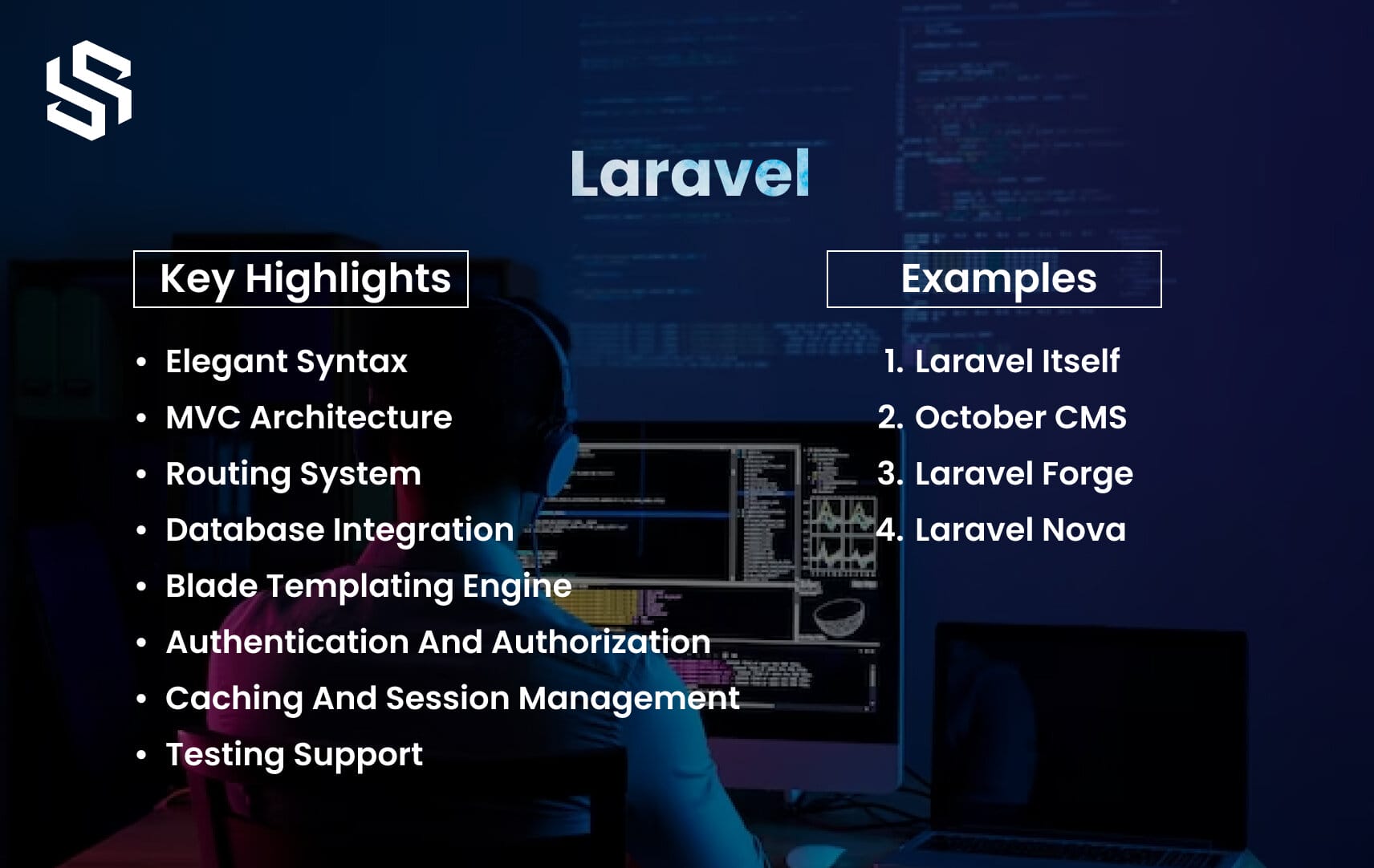
Key Highlights of Laravel
- Laravel offers an elegant syntax and follows MVC architecture for clean and readable code.
- It provides a powerful routing system for defining clean URLs and handling HTTP requests.
- Laravel includes Eloquent ORM for simplified database interactions and handling relationships.
- The Blade templating engine allows for dynamic and reusable templates.
- It has a comprehensive authentication and authorization system for secure user management.
- Built-in support for caching and session management enhances performance.
- Laravel includes a robust testing framework for ensuring application stability and reliability.
Examples of PHP Apps Built Using Laravel Frame work
1. Laravel itself
The Laravel framework’s official website and documentation are built using Laravel, showcasing its capabilities and serving as an example of a real-world application.
2. October CMS
October CMS is a popular content management system built on Laravel. It provides a user-friendly interface for managing website content and is widely used for creating blogs, portfolios, and small-to-medium-sized websites.
3. Laravel Forge
Laravel Forge is a server provisioning and deployment tool specifically designed for Laravel applications. It simplifies the process of setting up and managing servers, making it easier to deploy and scale Laravel applications.
4. Laravel Nova
Laravel Nova is an administration panel and dashboard builder for Laravel applications. It provides a customizable interface for managing application resources, such as users, posts, and settings, with minimal effort.
2. Symfony
Symfony is a popular PHP web framework known for its flexibility, scalability, and extensive set of reusable components. It follows the model-view-controller (MVC) architectural pattern and promotes best practices for building robust web applications.
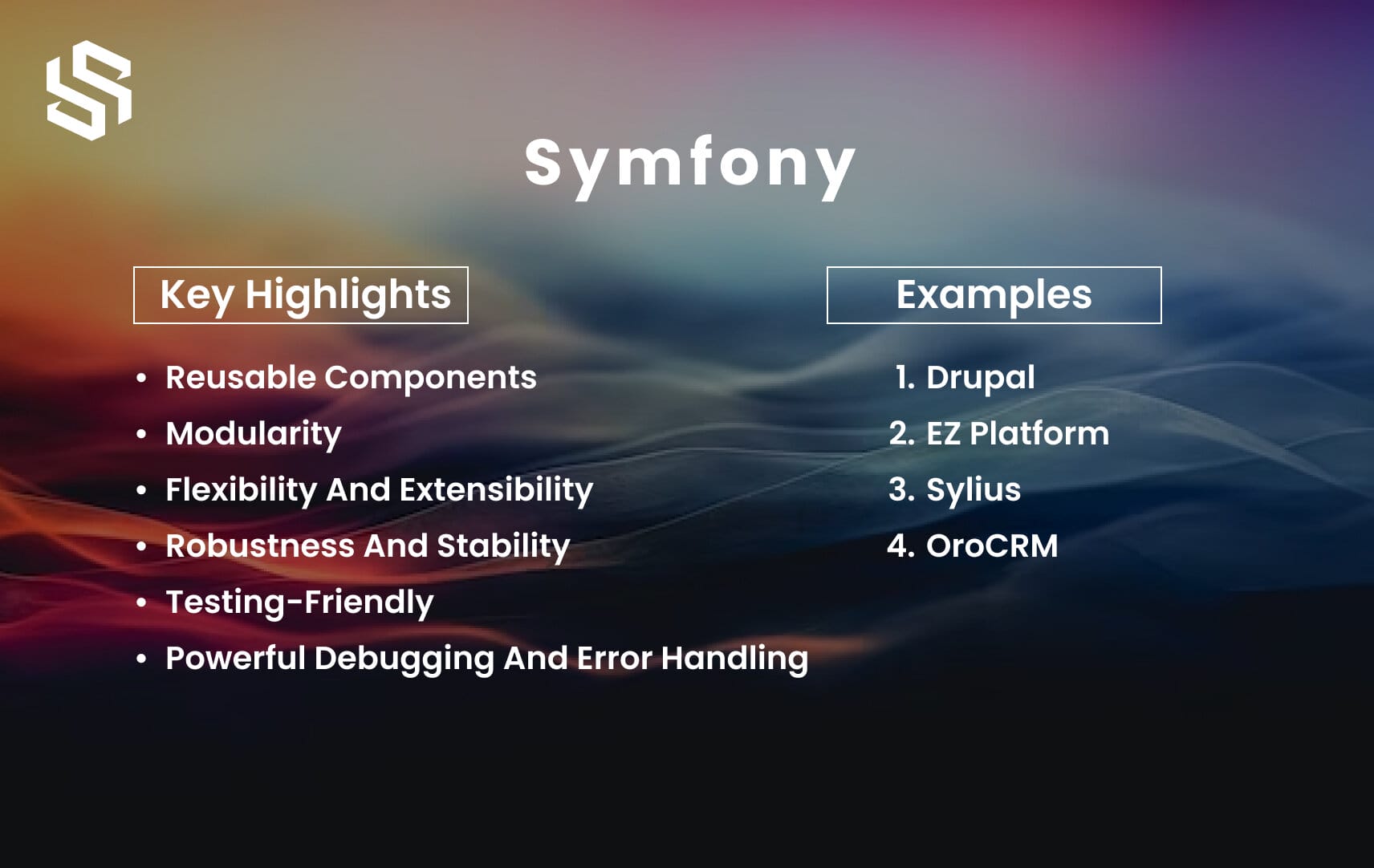
Key Highlights of Symfony
- Symfony offers reusable components for flexible and code-reusable development.
- Its modular architecture allows for lightweight and organized applications.
- Symfony is highly customizable and extensible, integrating third-party libraries with ease.
- Known for stability, Symfony provides long-term support and smooth upgrades.
- Symfony promotes testing with PHPUnit and Behat, enabling efficient and reliable development.
- Built-in debugging tools and error handling mechanisms aid in quick issue identification and resolution.
Examples of PHP Apps Built Using Symfony Framework
1. Drupal
Drupal, a popular open-source content management system (CMS), is built on top of Symfony components. Symfony’s robustness and flexibility contribute to the stability and extensibility of Drupal.
2. eZ Platform
eZ Platform is a modern content management system that utilizes Symfony components. It offers a flexible and scalable solution for building content-rich applications with a focus on user experience.
3. Sylius
Sylius is an open-source eCommerce platform that utilizes Symfony as its foundation. It provides a customizable and modular platform for building online stores and managing product catalogs, orders, and payments.
4. OroCRM
OroCRM is a customer relationship management (CRM) platform built on Symfony. It offers a comprehensive solution for managing customer interactions, sales, and marketing activities.
3. CakePHP
CakePHP is a popular PHP web framework that aims to make web application development faster and simpler. It follows the model-view-controller (MVC) architectural pattern and provides a robust set of features and conventions to streamline the development process.

Key Highlights of CakePHP
- CakePHP follows “convention over configuration” for quick setup and reduced configuration needs.
- It enables rapid development with scaffolding, code generation, and baked-in CRUD operations.
- CakePHP’s ORM simplifies database interactions and complex queries with an expressive syntax.
- It offers a flexible routing system for custom URL route definitions.
- Built-in security features protect against common vulnerabilities.
- CakePHP utilizes a template engine for modular and reusable views.
Examples of PHP Apps Built Using CakePHP Framework
1. BEdita
BEdita is an open-source content management framework built on CakePHP. It provides a flexible and extensible platform for managing content, creating APIs, and developing custom applications.
2. Croogo
Croogo is a popular open-source CMS (Content Management System) built on CakePHP. It offers a user-friendly interface for managing website content and supports various plugins and themes for customization.
3. Friends of Cake
Friends of Cake is a community-driven website built on CakePHP. It serves as a resource hub for CakePHP developers, providing documentation, tutorials, and a marketplace for plugins and themes.
4. OpenEMR
OpenEMR is an open-source electronic medical record (EMR) software built on CakePHP. It provides a comprehensive solution for managing patient records, appointments, billing, and other healthcare-related functionalities.
4. CodeIgniter
CodeIgniter is a lightweight and popular PHP web framework known for its simplicity and performance. It provides a small footprint while offering essential features for web application development. CodeIgniter follows the model-view-controller (MVC) architectural pattern and prioritizes simplicity and ease of use.
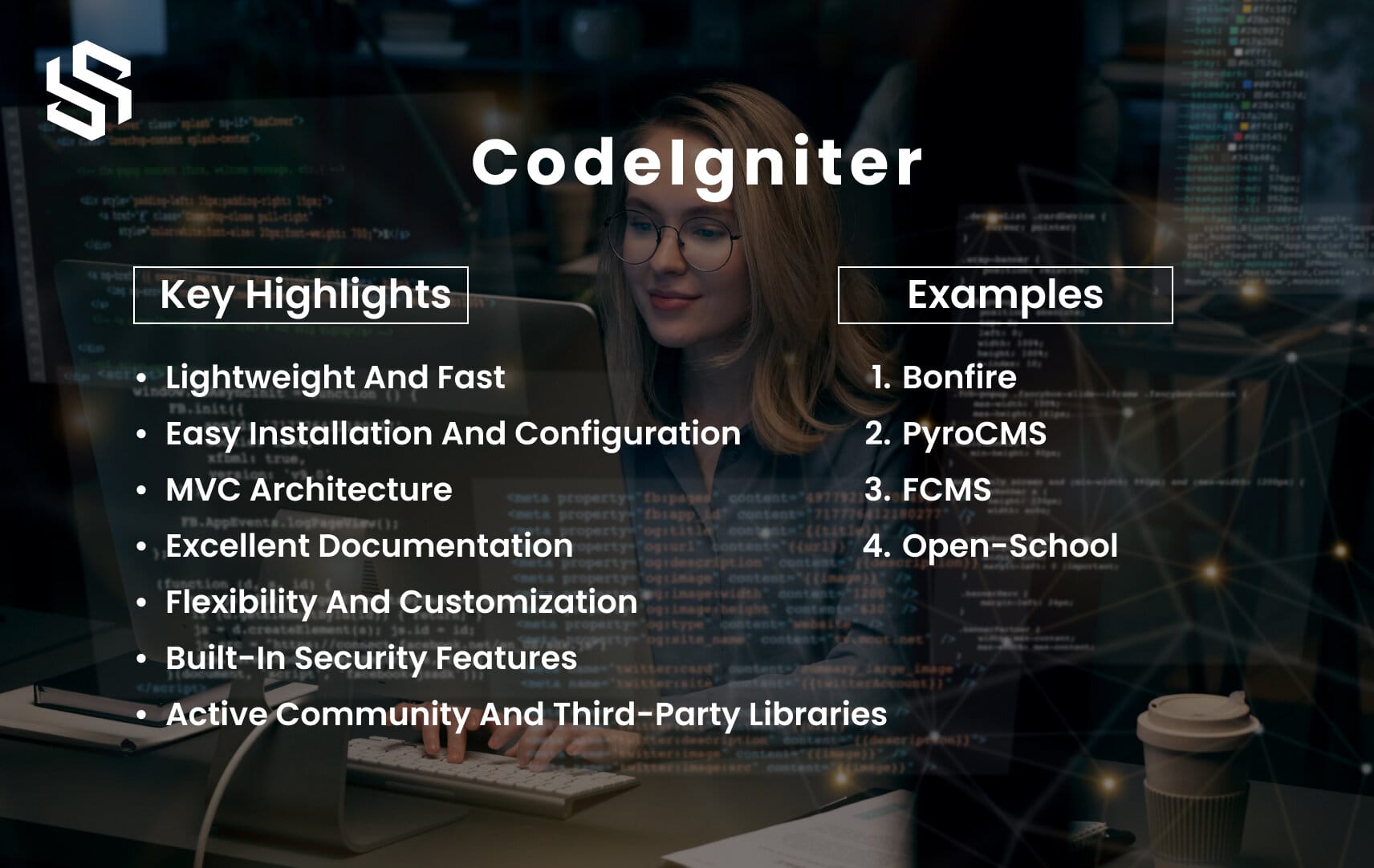
Key Highlights of CodeIgniter
- CodeIgniter is lightweight and fast, offering efficient performance.
- It provides easy installation and configuration for quick project setup.
- CodeIgniter follows the MVC architecture for improved code organization and maintainability.
- The framework has excellent documentation, offering comprehensive guidance for developers.
- CodeIgniter is flexible and customizable, allowing developers to tailor it to their specific needs.
- It includes built-in security features to protect against common vulnerabilities.
- CodeIgniter has an active community and a wide range of third-party libraries, plugins, and extensions for expanded functionality.
Examples of PHP Apps Built Using CodeIgniter Framework
1. Bonfire
Bonfire is a web application framework built on CodeIgniter. It provides a modular and extensible foundation for developing web applications, and it includes additional features such as user management, themes, and form generation.
2. PyroCMS
PyroCMS is a content management system built on CodeIgniter. It offers an easy-to-use interface for managing website content, creating custom layouts, and integrating various modules and addons.
3. FCMS
FCMS (Fire-CodeIgniter Management System) is a lightweight CMS built with CodeIgniter. It enables users to manage website content, including pages, menus, and media, through an intuitive administration panel.
4. Open-School
Open-School is an open-source school management system built on CodeIgniter. It provides features for managing students, courses, grades, attendance, and other administrative tasks related to educational institutions.
5. Yii
Yii is a high-performance PHP web framework known for its speed, security, and extensibility. It follows the model-view-controller (MVC) architectural pattern and provides a wide range of features and tools to simplify web application development.

Key Highlights of Yii
- Yii is a high-performance framework with caching mechanisms and optimization techniques for fast response times and scalability.
- It prioritizes security with built-in measures against SQL injection, XSS, and CSRF attacks.
- Yii has a rich extension ecosystem for easy integration of additional features and functionalities.
- Code generation tools and scaffolding features automate tasks and accelerate development.
- The framework offers intuitive database access and an ORM feature for simplified database interactions.
- Yii provides excellent support for building RESTful APIs with features like versioning and content negotiation.
Examples of PHP Apps Built Using Yii framework
1. HumHub
HumHub is an open-source social networking platform built on Yii. It provides features for creating social communities, collaboration, and content sharing.
2. Craft CMS
Craft CMS is a popular content management system built on Yii. It offers a flexible and intuitive interface for managing website content and includes features such as localization, custom fields, and user permissions.
3. Invoice Ninja
Invoice Ninja is an open-source online invoicing and billing platform built on Yii. It allows users to create and manage invoices, track payments, and generate reports.
4. Nextcloud
Nextcloud is a self-hosted file sharing and collaboration platform built on Yii. It provides features such as file syncing, file sharing, document collaboration, and calendar integration.
Have an idea that needs a robust web solution?
6. Phalcon
Phalcon is a high-performance PHP web framework known for its speed and low resource consumption. Unlike traditional PHP frameworks, Phalcon is implemented as a C extension, resulting in faster execution and reduced overhead. It offers a rich set of features and follows the model-view-controller (MVC) architectural pattern.
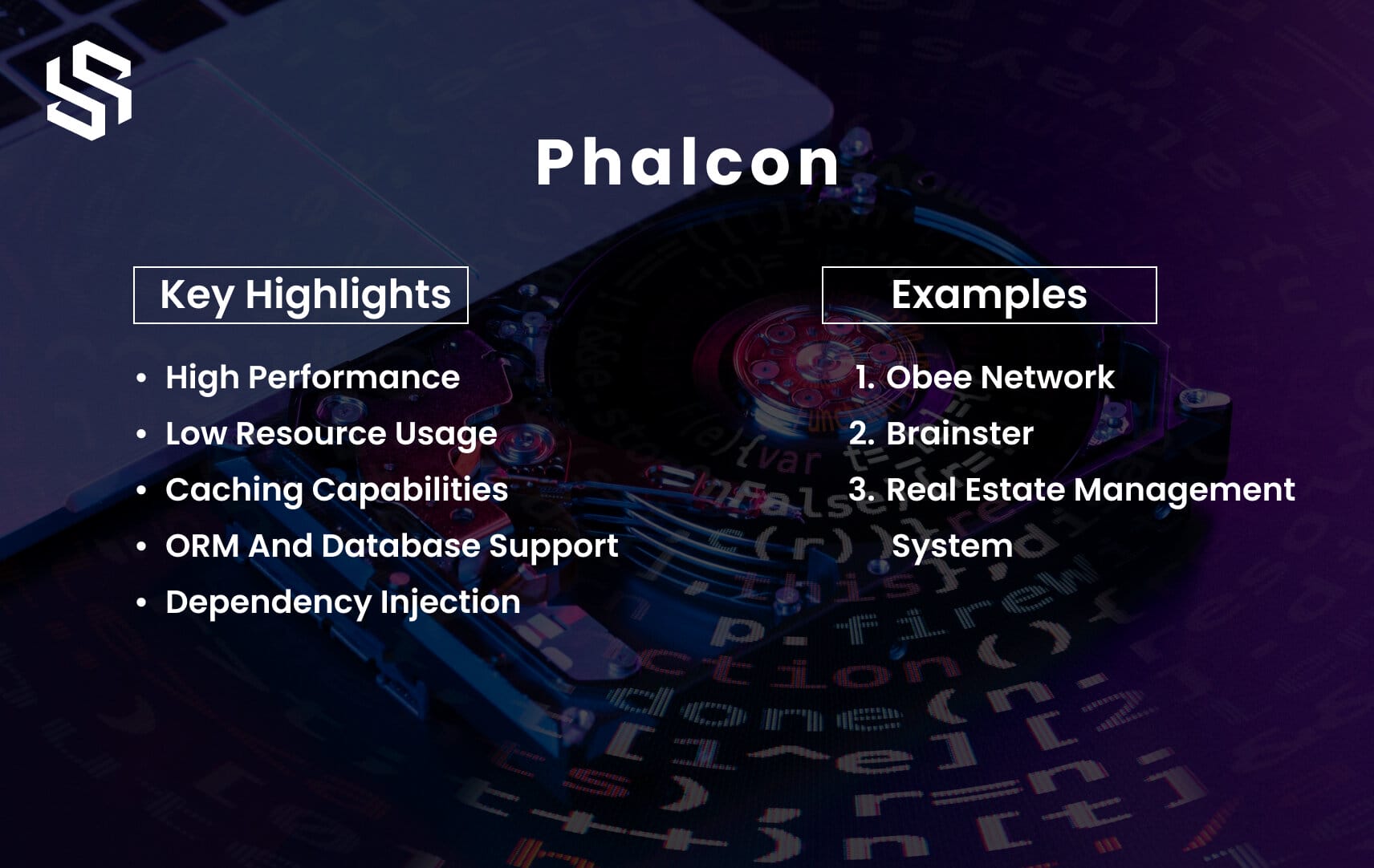
Key Highlights of Phalcon
- Phalcon is a high-performance PHP framework implemented as a C extension for faster execution and reduced resource consumption.
- Its low memory usage makes it suitable for high-traffic or resource-constrained applications.
- Phalcon follows the MVC architectural pattern for improved code organization and maintainability.
- It offers built-in caching capabilities, including data caching and full-page caching, to enhance application performance.
- Phalcon’s ORM feature simplifies database interactions and supports multiple database systems.
- The framework includes a powerful dependency injection container for managing dependencies and enhancing modularity and code reusability.
Examples of PHP Apps Built Using Phalcon Framework
1. Obee Network
Obee Network is a decentralized social media platform built on the Phalcon framework. It leverages Phalcon’s performance and low resource consumption to handle high user activity and ensure fast response times.
2. Brainster
Brainster is an online learning platform that offers courses and bootcamps. It utilizes the Phalcon framework for its high performance and efficient resource utilization to provide a seamless learning experience.
3. Real Estate Management System
Phalcon has been used to develop real estate management systems that handle property listings, search functionalities, and transaction management. Its performance benefits are particularly valuable for handling large amounts of data.
7. Laminas
Laminas, formerly known as Zend Framework, is a robust and flexible PHP framework that provides a collection of reusable components for building web applications. It follows the principle of “use-at-will,” allowing developers to choose and utilize specific components based on their project requirements.
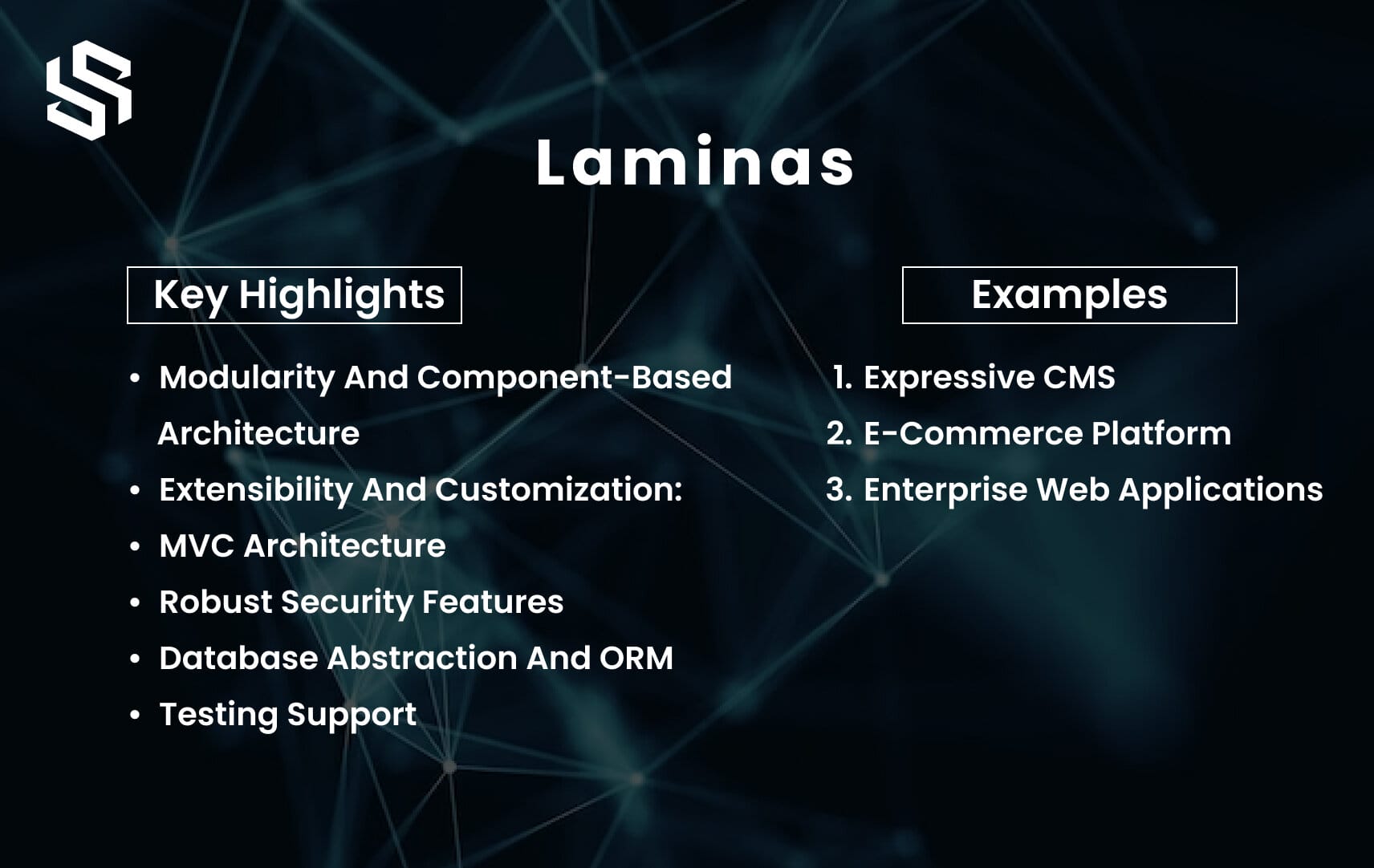
Key Highlights of Laminas
- Laminas promotes modularity and component-based architecture, enhancing code reusability and maintainability.
- It offers extensibility and customization, allowing developers to tailor the framework to their specific project requirements.
- Laminas follows the MVC architectural pattern, improving code organization and facilitating code reusability.
- The framework incorporates robust security features for protecting applications against common vulnerabilities.
- Laminas provides a powerful database abstraction layer and ORM for simplified database interactions.
- It includes a comprehensive testing framework for ensuring application reliability and stability.
Examples of PHP Apps Built Using Laminas Framework
1. Expressive CMS
Expressive CMS is a content management system built on top of the Laminas framework. It utilizes Laminas components for routing, caching, form handling, and authentication, providing a flexible and extensible platform for managing content.
2. E-commerce platform
Laminas is used to develop e-commerce platforms that handle product listings, shopping carts, order processing, and payment integration. Its modularity and customizable components make it suitable for building scalable and robust e-commerce applications.
3. Enterprise web applications
Laminas is commonly employed in the development of enterprise-grade web applications that require robust security, scalability, and modular architecture. Its extensive component library and flexibility make it well-suited for complex and large-scale projects.
8. FuelPHP
FuelPHP is an open-source web application framework written in PHP that is designed to be fast, secure, and flexible. It incorporates modern PHP features and follows the MVC architectural pattern, providing a clear separation of concerns.

Key Highlights of FuelPHP
- HMVC architecture enables better code organization and modularity.
- Security features ensure secure application development.
- ORM simplifies database interactions and offers an intuitive query builder.
- Caching capabilities improve application performance.
- Native support for building RESTful APIs facilitates scalable API development.
- Flexible template engine separates presentation logic for reusable views.
Examples of PHP Apps Built Using FuelPHP Framework
1. OpenBiblio
OpenBiblio is an open-source library management system that allows libraries to manage their catalog, borrowers, circulation, and other library-related activities. It utilizes the FuelPHP framework to provide a robust and user-friendly interface for library administrators and patrons.
2. PressPi
PressPi is a content management system (CMS) built on top of the FuelPHP framework. It offers features like customizable themes, user management, content publishing, and search engine optimization (SEO) tools. PressPi provides a flexible and scalable solution for building websites and managing their content.
3. ProjectPier
ProjectPier is a project management application that enables teams to collaborate, track tasks, and manage projects efficiently. It leverages the FuelPHP framework to provide a user-friendly interface, task management features, file sharing capabilities, and project tracking functionalities.
4. Freeply
Freeply is a social media platform built using FuelPHP. It allows users to create profiles, connect with friends, share updates, photos, and videos, and engage in discussions. Freeply utilizes the FuelPHP framework to handle user authentication, data storage, and social interactions.
9. PHPixie
PHPixie is a PHP-based full-stack framework designed for developing web applications. It follows the Model-View-Controller (MVC) architectural pattern, which separates the application logic into three components: the model (data and business logic), the view (presentation layer), and the controller (handles user input and coordinates the model and view).

Key Highlights of PHPixie
- PHPixie is a lightweight and fast PHP framework with minimal overhead.
- It has a modular structure for easy assembly of applications, promoting code reusability and maintainability.
- It provides an ORM component for simplified database interactions and avoids the need for raw SQL queries.
- PHPixie incorporates security measures to protect against common vulnerabilities like SQL injection and XSS.
- The framework offers a powerful routing system for clean and user-friendly URLs.
- It includes a flexible templating engine to separate presentation logic from business logic.
- PHPixie encourages automated testing with built-in tools for reliability and correctness.
- The framework has an active community, comprehensive documentation, tutorials, and examples for support and learning.
Examples of PHP Apps Built Using PHPixie Framework
1. Bokun
Bokun is a booking and reservation platform for the travel industry. It leverages PHPixie’s modular structure and ORM capabilities to handle complex database operations and provide a seamless booking experience.
2. Invoice Ninja
Invoice Ninja is an open-source platform for managing invoices, payments, and expenses. It utilizes PHPixie’s lightweight nature and routing system to create a user-friendly interface for generating and tracking invoices.
3. Open Source Social Network (OSSN)
OSSN is a social networking platform built on PHPixie. It takes advantage of PHPixie’s modular structure to extend its functionality and provide features like user profiles, friend connections, and activity feeds.
4. Shopware
Shopware is an e-commerce platform that offers a range of features for online stores. It utilizes PHPixie’s modular structure to customize and expand its functionality, enabling businesses to create and manage their online shops effectively.
5. CSZ CMS
CSZ CMS is a content management system that allows users to create and manage websites easily. It uses PHPixie’s templating engine and routing system to provide a flexible and customizable website-building experience.
10. Fat-Free Framework
Fat-Free Framework, also known as F3, is a lightweight yet powerful PHP micro-framework that aims to provide a robust set of features while maintaining simplicity and efficiency. It follows a minimalist design philosophy, focusing on essential functionalities and avoiding unnecessary complexity.
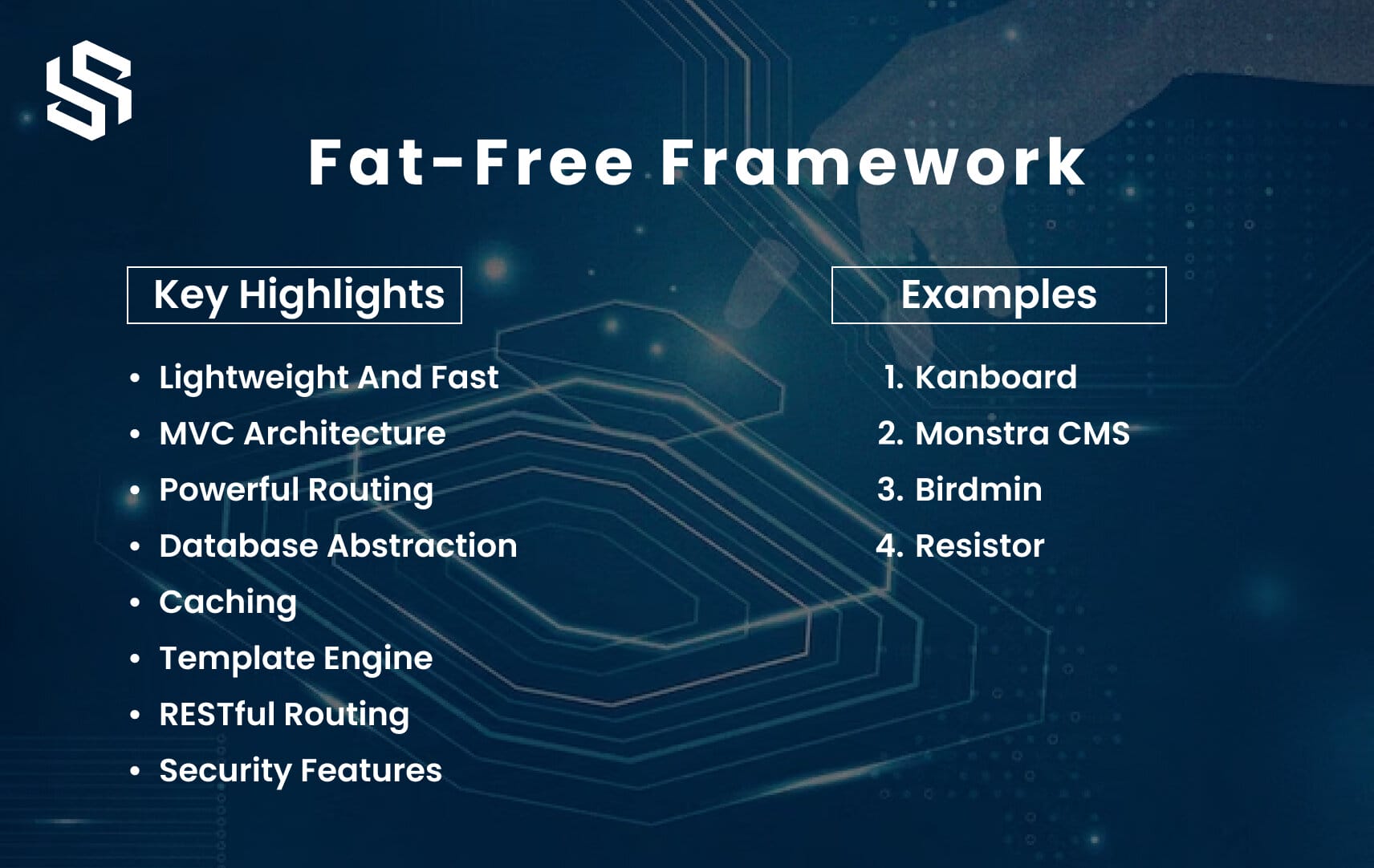
Key Highlights of Fat-Free Framework
- Fat-Free Framework is a lightweight and fast PHP micro-framework with minimal overhead.
- It follows the MVC architectural pattern for improved code organization and maintainability.
- The framework offers a powerful routing system for defining clean and user-friendly URLs.
- F3 provides a database abstraction layer for simplified database interactions with support for various database systems.
- Caching mechanisms are included in the framework to optimize application performance.
- Fat-Free Framework has a flexible template engine for separating presentation logic from application code.
- It supports RESTful routing, making it easy to build RESTful APIs.
- The framework incorporates security features like input validation, output encoding, and CSRF protection to enhance application security.
Examples of PHP Apps Built Using Fat-Free Framework
1. Kanboard
Kanboard is a project management tool that helps teams organize and track tasks. It utilizes the Fat-Free Framework to provide a lightweight and efficient platform for managing projects and collaborating on tasks.
2. Monstra CMS
Monstra CMS is a content management system built on the Fat-Free Framework. It offers a simple and intuitive interface for creating and managing websites, including features such as user management, page creation, and template customization.
3. Birdmin
Birdmin is a lightweight and flexible CMS built with Fat-Free Framework. It allows users to easily manage and edit website content, including pages, blog posts, and media files, providing a streamlined content management experience.
4. Resistor
Resistor is a lightweight and efficient ORM (Object-Relational Mapping) library built on top of Fat-Free Framework. It simplifies database interactions by providing a convenient API for querying and manipulating data.
11. Silex
Silex Framework is a micro-framework for PHP that aims to be simple, lightweight, and flexible. It is built on top of the Symfony components and follows the principles of simplicity and minimalism. While it is no longer actively maintained as of 2018, it still remains a viable option for small-scale projects or for developers who prefer its lightweight approach.
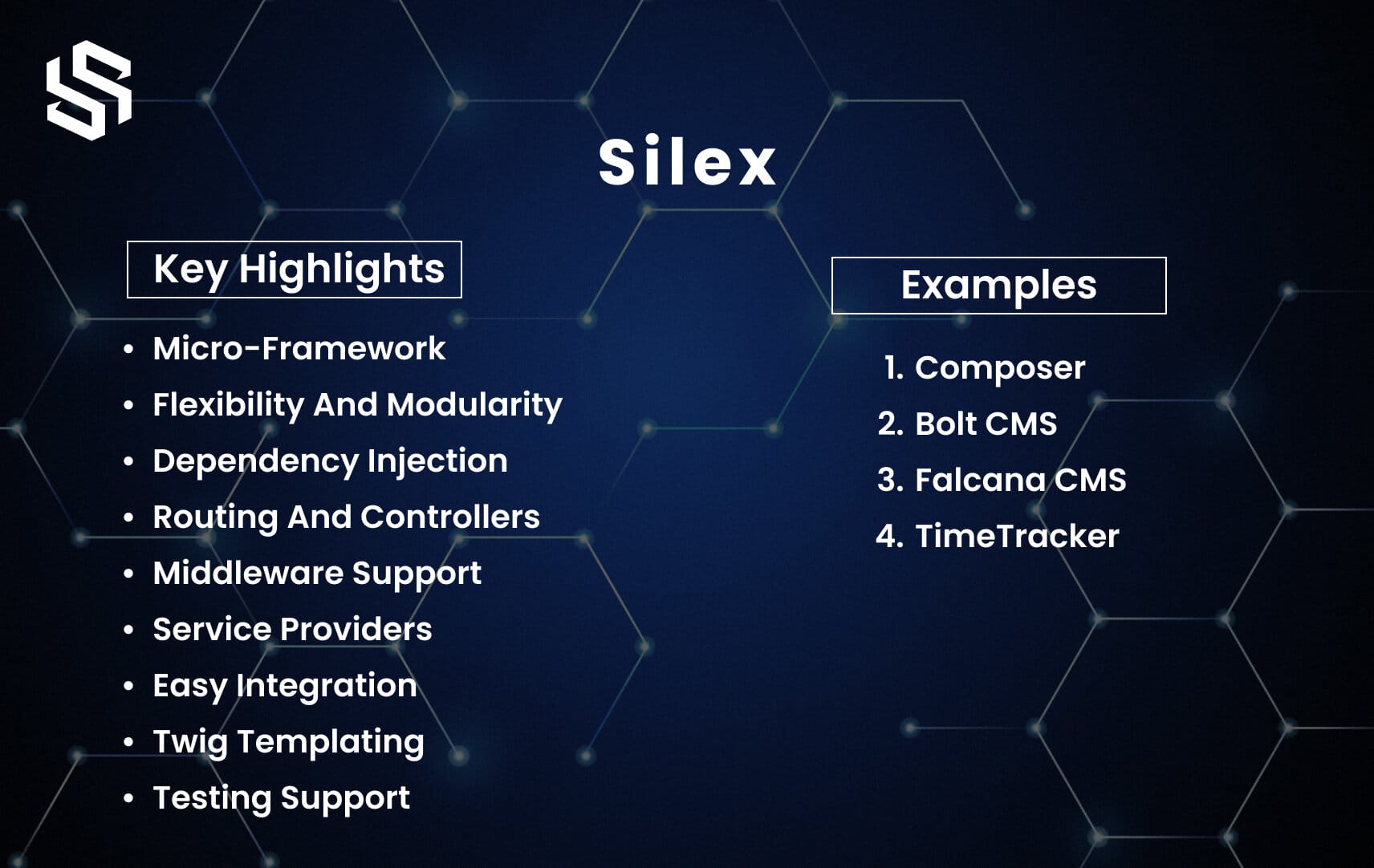
Key Highlights of Silex
- Silex is a micro-framework designed for small to medium-sized applications, offering essential functionalities without the bulk of larger frameworks.
- It provides flexibility and modularity, allowing developers to selectively include components and libraries based on their specific needs.
- Silex utilizes the Symfony Dependency Injection component, enabling clean code organization and efficient management of object dependencies.
- The framework offers a simple routing system for defining URL patterns and mapping them to controller actions, making it easy to create RESTful APIs or web applications.
- Silex supports middleware, allowing developers to add reusable code for tasks like authentication, logging, or request/response manipulation.
- It employs service providers to encapsulate and configure reusable services, simplifying the integration of external libraries and custom functionality.
- Silex can be easily integrated with other Symfony components, allowing developers to use additional functionality as needed.
- The framework uses the Twig templating engine, which provides a flexible and powerful way to create dynamic views and templates.
- Silex includes testing tools and utilities that facilitate unit testing and integration testing, promoting the development of reliable and robust applications.
Examples of PHP Apps Built Using Silex Framework
1. Composer
Composer is a popular dependency management tool for PHP. It is built using Silex, leveraging its micro-framework capabilities to provide a lightweight and efficient solution for managing PHP packages and dependencies.
2. Bolt CMS
Bolt is a content management system that allows users to create and manage websites. It utilizes Silex as its foundation, providing a flexible and extendable platform for building and customizing websites with ease.
3. Falcana CMS
Falcana CMS is a lightweight and user-friendly content management system built on top of the Silex Framework. It offers features such as page management, template customization, and user authentication.
4. TimeTracker
TimeTracker is an application that helps users track their time and manage projects. It uses the Silex Framework to provide a simple and efficient interface for logging and analyzing time spent on different tasks.
Looking for expert PHP developers to build elegant and efficient web applications?
12. Li3
Li3 (Lithium) Framework is an open-source PHP framework known for its simplicity, flexibility, and performance. It aims to provide a streamlined development experience while offering powerful features for building scalable web applications. Li3 is designed to follow modern coding practices and promotes code reusability and modular architecture.
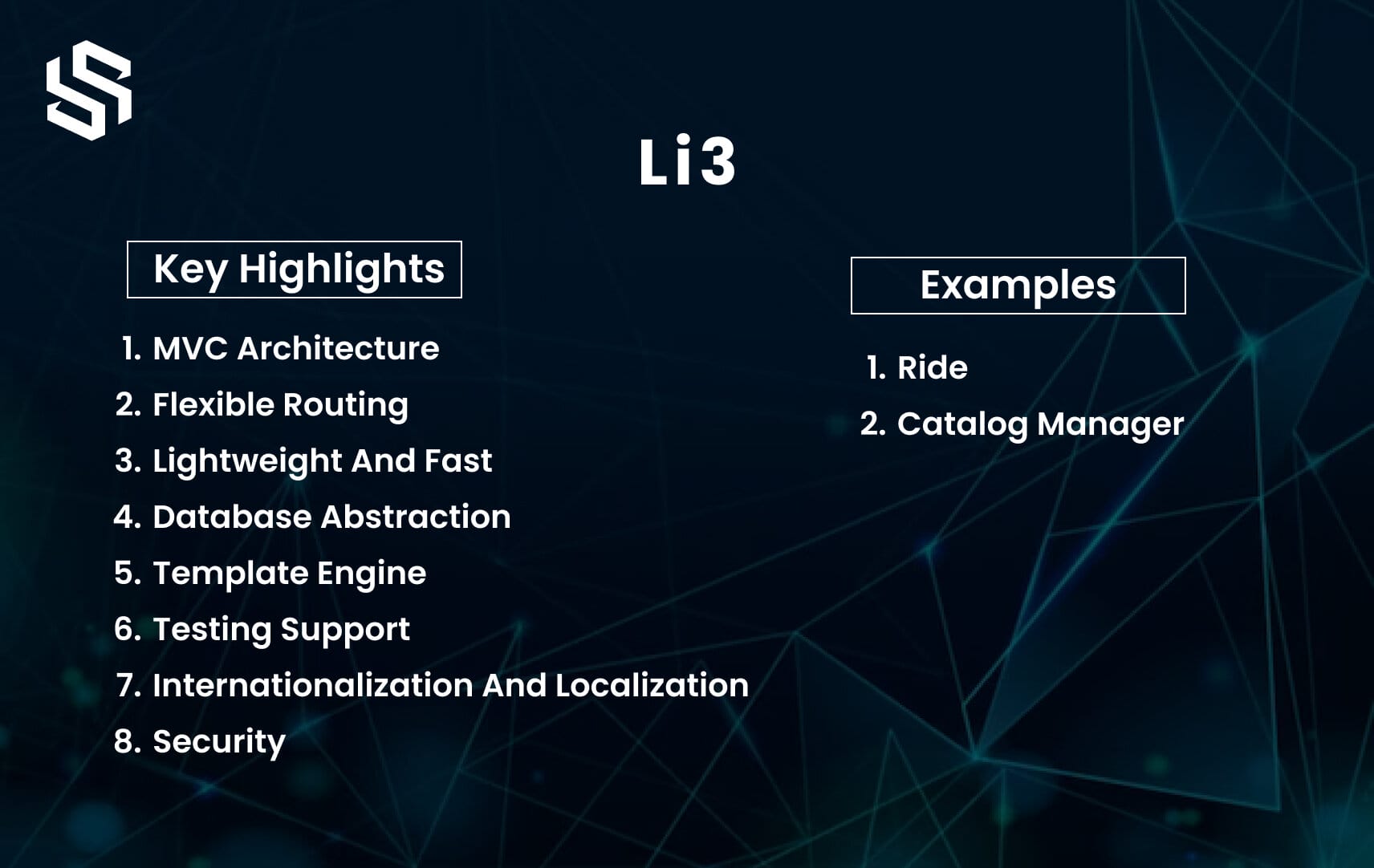
Key Highlights of Li3
- Li3 Framework follows the MVC architecture, separating concerns and organizing application logic.
- It provides a flexible routing system for defining URL patterns and supporting RESTful routing.
- Li3 is lightweight and fast, ensuring optimized performance and minimal overhead.
- The framework offers a powerful database abstraction layer with query builder and ORM capabilities.
- It includes a template engine for separating presentation logic from application code.
- Li3 supports testing with built-in tools for unit, integration, and functional testing.
- Features for internationalization and localization make it easier to develop multilingual applications.
- Security measures like input validation and protection against SQL injection and XSS vulnerabilities are incorporated in the framework.
Examples of PHP Apps Built Using Li3 Framework
1. Ride
Ride is an open-source ride-sharing platform built with the Li3 Framework. It allows users to book rides, track drivers, and manage their ride history. The Li3 Framework’s lightweight and flexible nature makes it suitable for building such scalable and efficient transportation applications.
2. Catalog Manager
Catalog Manager is a web application developed using the Li3 Framework. It enables users to create, manage, and organize product catalogs. With Li3’s support for modular architecture and database abstraction, Catalog Manager provides an intuitive interface for managing products, categories, and inventory
13. Pop PHP Framework
The Pop PHP Framework is a lightweight and flexible PHP framework designed for building scalable web applications. It emphasizes simplicity, performance, and code reusability, making it suitable for a wide range of projects.

Key Highlights of Pop PHP Framework
- Pop PHP Framework is lightweight and fast, offering improved performance.
- It follows the MVC architecture, allowing for clean separation of concerns and better code organization.
- The framework supports dependency injection for managing and configuring dependencies.
- It provides a powerful routing system for defining clean and user-friendly URLs.
- Pop PHP includes a database abstraction layer for simplified database interactions.
- Templating engine allows for separating presentation logic from the application code.
- Security features like input validation and protection against SQL injection and XSS vulnerabilities are incorporated.
- It offers testing support with tools for unit testing and integration testing.
Examples of PHP Apps Built Using Pop PHP Framework
1. Joomlatools
A suite of extensions for Joomla, built using the Pop PHP Framework and other technologies.
2. GetChef
A meal planning and grocery delivery app built using the Pop PHP Framework, along with other technologies such as ReactJS.
3. Smart-M3
A software stack for developing semantic IoT applications, which uses the Pop PHP Framework for its backend.
4. MinervaKB
A knowledge base and helpdesk solution for WordPress, built using the Pop PHP Framework and other technologies.
5. Open Semantic Search
An open source search and text analytics suite, built using the Pop PHP Framework for its backend.
14. PRADO
PRADO is a PHP web application framework that follows the event-driven programming paradigm. It provides a component-based architecture and a rich set of pre-built components, allowing developers to build robust and maintainable web applications with ease.

Key Highlights of PRADO Framework
- PRADO utilizes a component-based architecture for code reusability and easy maintenance.
- It follows an event-driven programming model for creating interactive and responsive web applications.
- The framework emphasizes rapid application development through a collection of pre-built components.
- PRADO includes a visual designer tool for visually designing web pages and interfaces.
- It provides a database abstraction layer for simplified database operations.
- Security measures such as input validation and output encoding are incorporated into PRADO.
- Templating engine enables separation of presentation logic and supports dynamic and reusable views.
Examples of PHP Apps Built Using PRADO Framework
1. ShopEx
An e-commerce platform built using the PRADO Framework, offering features such as product management, shopping cart, and secure payment processing.
2. CMSB
A content management system (CMS) built with PRADO, allowing users to create and manage website content, including articles, images, and multimedia.
3. ProjectTrack
A project management tool developed using PRADO, providing features for task management, team collaboration, and progress tracking.
4. ForumMaster
A community forum application built with PRADO, enabling users to engage in discussions, create topics, and interact with other members.
15. Drupal
Drupal is a powerful and widely-used open-source content management system (CMS) written in PHP. It provides a robust framework for building dynamic websites, applications, and online communities. Drupal offers a flexible architecture and a wide range of modules and themes, allowing developers to create highly customizable and scalable web solutions.
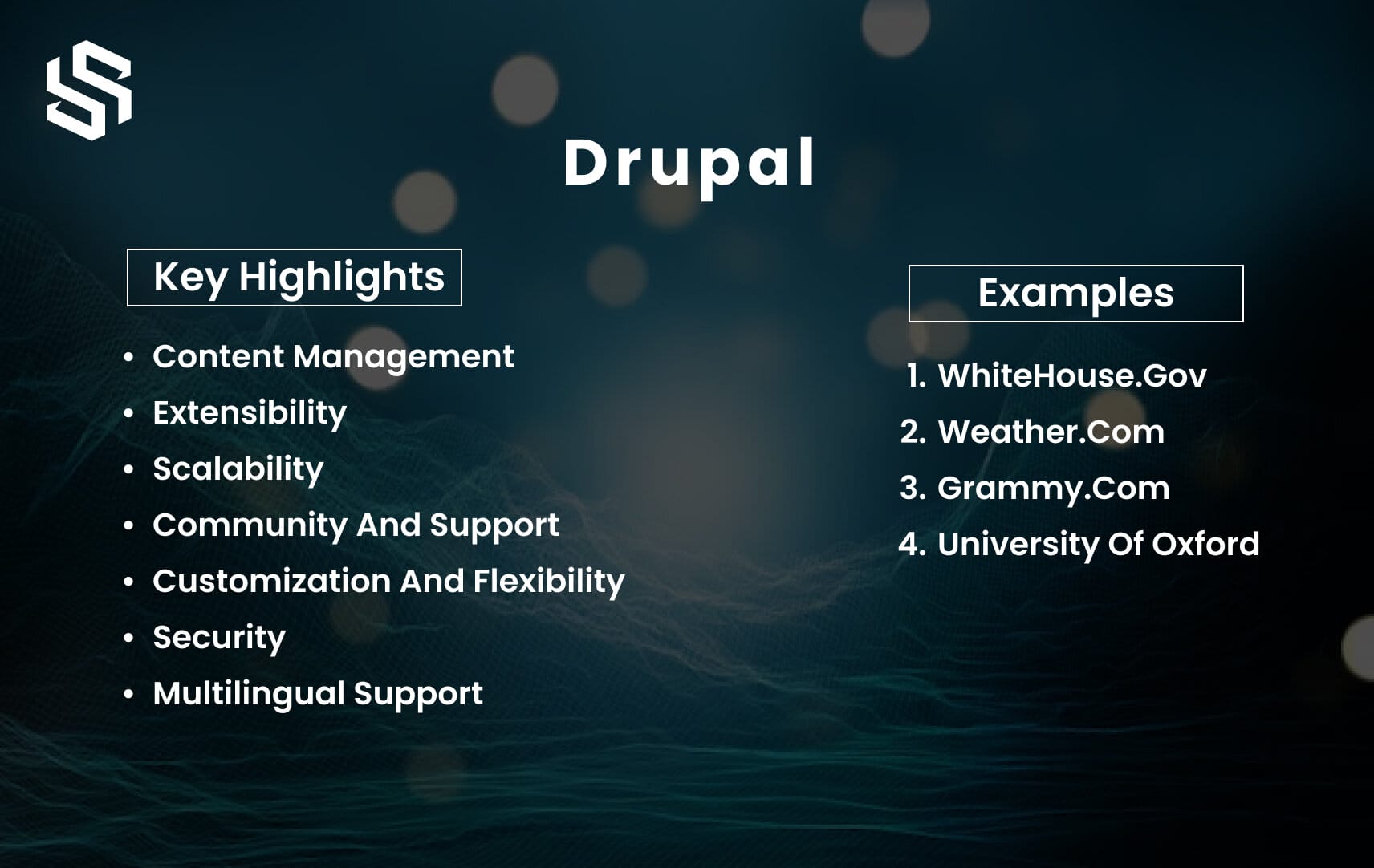
Key Highlights of Drupal Framework
- Drupal excels in content management, supporting various content types and providing a user-friendly interface.
- It offers a vast collection of modules and themes for extending functionality and customizing the appearance of websites.
- Designed for scalability, Drupal can handle large-scale projects and optimize performance.
- The vibrant Drupal community provides ongoing support, updates, and extensive documentation.
- Its modular architecture allows for customization and integration with third-party systems.
- Drupal prioritizes security, with a dedicated team addressing vulnerabilities and following best practices.
- Robust multilingual support enables the creation of websites and applications in multiple languages.
Examples of PHP Apps Built Using Drupal Framework
1. WhiteHouse.gov
The official website of the United States White House is built using Drupal, showcasing its ability to handle high-traffic, content-rich websites.
2. Weather.com
The popular weather forecasting website relies on Drupal to manage its content and deliver localized weather information to users.
3. Grammy.com
The official website of the Grammy Awards is powered by Drupal, showcasing its capability to handle large-scale events and multimedia-rich content.
4. University of Oxford
Drupal is used by the University of Oxford to manage its website, providing a platform for various academic departments, research projects, and publications.
16. Horde
Horde is an open-source groupware and web application framework written in PHP. It provides a comprehensive set of tools and components for building collaborative web applications, including email clients, calendars, task management systems, and more. Horde emphasizes modularity, extensibility, and flexibility, making it suitable for various types of web-based collaboration platforms.
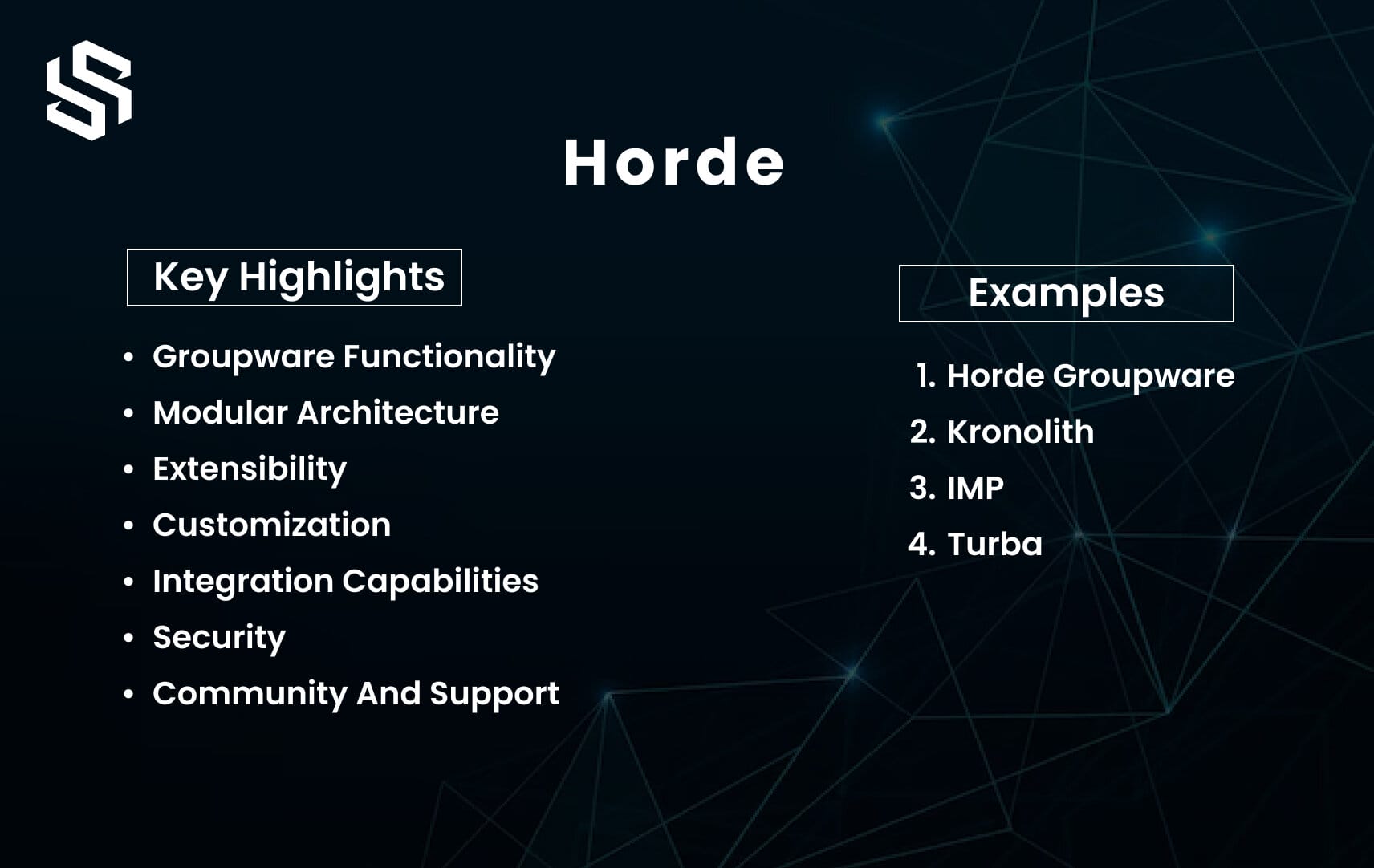
Key Highlights of Horde Framework
- Horde provides a comprehensive set of collaborative tools for email, calendars, address books, tasks, and notes.
- Developers can selectively enable or disable components for code reusability and easy maintenance.
- Custom applications and functionalities can be easily created using APIs and hooks for integration.
- The user interface and design can be customized with themes, templates, and layouts.
- Horde can integrate with various third-party systems and services to enhance application functionality.
- Measures like input validation, output encoding, and encryption ensure data security.
- Active community with documentation, forums, and resources for assistance and knowledge sharing.
Examples of PHP Apps Built Using Horde Framework
1. Horde Groupware
The flagship application built with the Horde Framework, providing a complete suite of groupware tools for email, calendars, tasks, and more.
2. Kronolith
A web-based calendar application built on top of the Horde Framework, offering features such as event scheduling, reminders, and shared calendars.
3. IMP
An email client application developed using the Horde Framework, providing a feature-rich and customizable interface for managing email accounts.
4. Turba
A web-based address book application built with Horde, allowing users to store and manage their contacts, groups, and contact details.
17. Zikula
Zikula is an open-source web application framework written in PHP. It is built on top of the Symfony framework and follows a modular architecture, allowing developers to extend its functionality through modules and plugins.
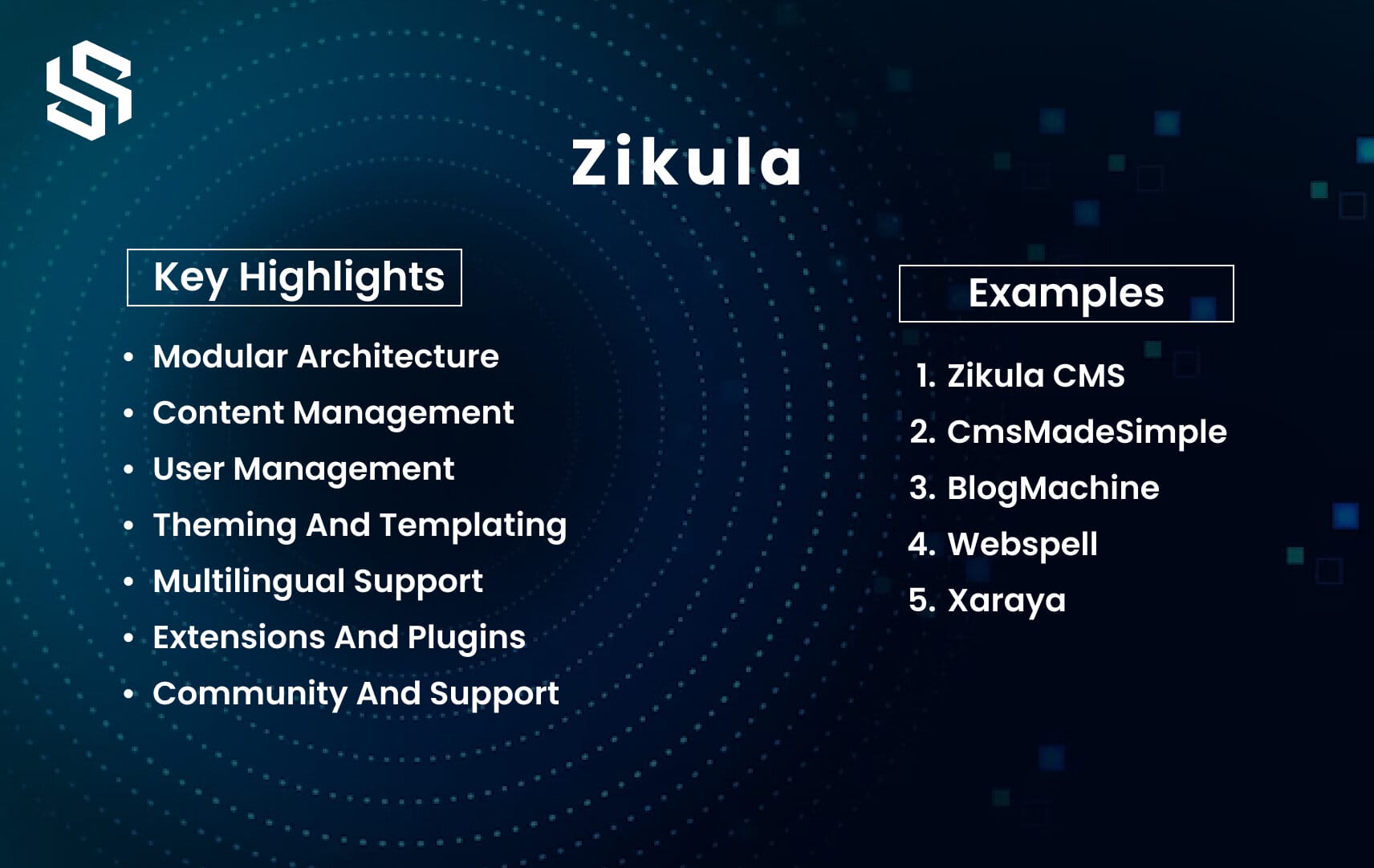
Key Highlights of the Zikula Framework
- Easily customize and extend functionality with modular approach.
- Robust features for creating and managing various types of content.
- User registration, authentication, access control, and profile management.
- Create custom themes and layouts for visual customization.
Built-in support for creating multilingual applications. - Wide range of options to enhance functionality with third-party integrations.
- Active and supportive community offering documentation and resources.
Examples of PHP Apps Built Using Zikula Framework
1. Zikula CMS
Zikula itself is a content management system built on top of the Zikula framework. It provides a robust platform for creating and managing websites, blogs, forums, and other content-driven applications.
2. CmsMadeSimple
CmsMadeSimple is a popular content management system built using the Zikula framework. It offers a user-friendly interface, customizable templates, and a range of features for managing and publishing content.
3. BlogMachine
BlogMachine is a blogging platform built on the Zikula framework. It provides a simple and intuitive interface for creating and managing blog posts, categories, tags, and user comments.
4. Webspell
Webspell is a competitive gaming management system that uses the Zikula framework. It allows users to create and manage gaming leagues, teams, matches, and player profiles.
5. Xaraya
Xaraya is an open-source web application framework and content management system built on top of the Zikula framework. It provides a flexible platform for developing and managing websites and web applications.
Need rapid development without sacrificing quality?
Contact us to create feature-rich applications with clean code and seamless user experiences.
Conclusion
PHP frameworks play a crucial role in web development in 2023 by providing developers with the necessary tools and structure to build robust and efficient applications. The top 15+ PHP frameworks mentioned earlier offer a wide range of features, functionalities, and architectural patterns to cater to different project requirements and development styles.
From popular choices like Laravel and Symfony to emerging frameworks like Laminas and CakePHP, there is a framework available for every business, whether small or large, looking to establish or scale their online presence.
If you are seeking professional web development services or Web development company, Syndell is the ideal partner. Our team of skilled web developers has extensive experience working with the best PHP frameworks and can create custom solutions tailored to your specific business needs. From frontend design to backend development, Syndell offers comprehensive web development services to ensure your online presence stands out in the competitive digital landscape.
Hire dedicated web developers to gain access of top talent well-versed in the most popular web frameworks. Their developers stay up-to-date with the latest trends and technologies, ensuring they deliver cutting-edge solutions that drive your business forward. Contact us today to discuss your web development project and bring your vision to life.
FAQs
PHP frameworks offer several advantages for web development, including faster development time, code reusability, improved security, scalability, and community support. They provide a foundation that follows industry standards and conventions, making it easier to build and maintain robust web applications.
When choosing a PHP framework, consider factors such as project requirements, scalability needs, learning curve, community support, documentation, performance, and available features. Evaluate frameworks based on these criteria to find the one that best fits your project goals and development style.
While it’s technically possible to use multiple PHP frameworks in a project, it’s generally not recommended unless there’s a specific need. Each framework has its own architecture and conventions, which may conflict when combined. It’s usually more efficient to choose a single framework that meets all the project requirements.
PHP frameworks incorporate security features, such as input validation, output sanitization, CSRF protection, and SQL injection prevention, by following best practices and coding standards. They also release regular security updates to address vulnerabilities and ensure the safety of web applications.
Yes, many PHP frameworks are designed to handle large-scale enterprise projects. Frameworks like Laravel and Symfony offer scalability features, performance optimization techniques, and support for complex applications, making them suitable choices for enterprise-level web development.
Yes, PHP frameworks provide flexibility and customization options. You can create custom themes, templates, and layouts to match your desired design. Additionally, frameworks often offer extension points and APIs that allow you to add or modify functionality to meet specific project requirements.
PHP frameworks typically have active communities of developers who provide support, share knowledge, and contribute to the development of the framework. You can find documentation, tutorials, forums, and online resources to help you learn and troubleshoot issues related to the framework.
To hire a skilled PHP developer, consider their experience with the specific frameworks you are interested in, their portfolio of previous projects, and their understanding of web development best practices.


